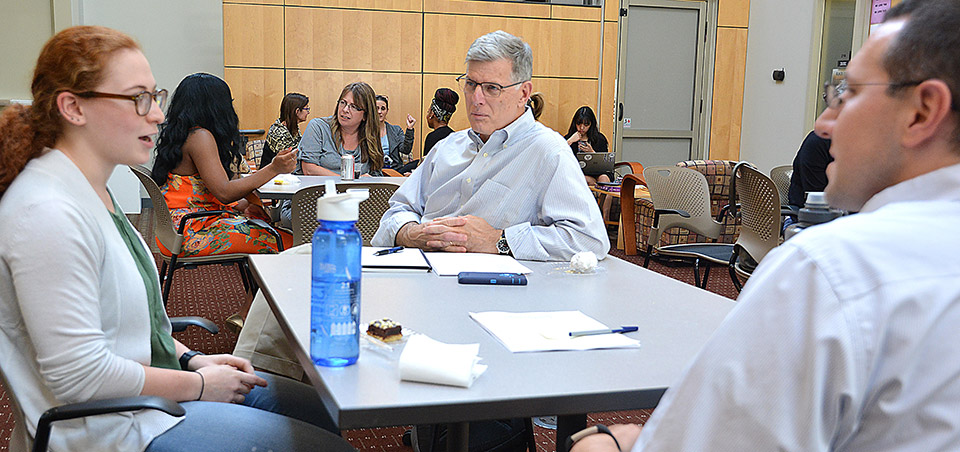From the State House to Capitol Hill: An ENACT Student Journey

Sage Rosenthal, left, discusses her ENACT experience with faculty fellows Michael Rich of Emory University, center, and Joseph Mead of Cleveland State University.
Sage Rosenthal reflects on how ENACT prepared her for a congressional internship
July 24, 2018
This past spring semester I had the privilege of taking Professor Stimell's "Advocacy for Policy Change" class at Brandeis University — part of ENACT: The Educational Network for Active Civic Transformation.
The ENACT course allowed me to explore the field of policy through a single piece of Massachusetts mental health legislation. This course allowed me to speak with professionals in legislation, policy, and mental health, and ultimately was the driving factor that inspired me to work on Capitol Hill in D.C. this summer.
I was able to delve into the advocacy field from a policy perspective, helping me utilize my writing, speaking, and research skills into a topic I care about. I also had the opportunity to speak with new ENACT Faculty Fellows at the ENACT Institute in May.
But now, instead of walking into the Massachusetts State House as an advocate, I am walking into Longworth House Building as staff, hopeful for the work coming my way.
My ENACT experience learning about the legislative process and seeing it through the eyes of an advocate has allowed me to translate that knowledge into my work for Congresswoman Katherine Clark.
I feel as if I can better relate to constituents and advocacy groups because I have been in their shoes. I know what it is like to be an advocate fighting for social justice, and it has been eye-opening now being on the other side of the conversation. I feel much more well-informed in the process and I better understand how constituents and advocates are taken into account.
At the same time, it is important to understand that, working for a Massachusetts representative, most of the time the constituents and the congresswoman are on the same side of an issue.
As a dedicated advocate to social justice, I am looking forward to continuing my journey working in Congresswoman Clark's D.C. office, grappling with hot-topic policy issues and working hands-on with legislative work. Just this week, after working on a bill memo for H.R. 1298 — CT Colonography Screening for Colorectal Cancer Act, which would cover computed tomography colonography (CTC) – a less invasive colorectal cancer screening for Medicare patients – they decided to sign my congresswoman on as a cosponsor. I was able to utilize my interest and passion for health in my work on the Hill.
Some other work I was able to do this past week was to go to a hearing and a briefing on health-related topics. I went to a hearing on reducing the costs of health care in America, where four different advocates from various roles in the medical field explored ideas that may help the critical problem of increasing healthcare costs.
It was fascinating hearing their ideas developed from their first-hand experiences, and hearing how the senate committee reacted and commented. For example, one doctor suggested the need for price transparency in order to help the consumer better understand what they are paying for, as well as increase competition. In response, a senator suggested that it would only work if there was a quality evaluation paired with the prices, because otherwise consumers would constantly make the mistake of assuming expensive equals quality.
The briefing I had the privilege to attend was about Community Living Centers (CLC) for veterans that received low, one-star, ratings. The purpose of the briefing was to explore the reason for these low ratings and discuss the effort being made to reverse them.
Both of the events were in Senate buildings, so I also took the opportunity to explore my way from House to Senate in various ways. Below is a picture of me taking the underground Capitol shuttle from the Senate building to the Capitol! I'm still working on not getting lost, but the exploration never seems to end!
In both my experience at the hearing and the briefing, I was able to take in the information from the speakers and members both as a staffer and an advocate alike. There were people in the audience filling various roles, and we were all there for the same purpose: a better understanding of the information. It was an opportunity where I was able to combine the roles I've played in advocacy, and continue my journey working for social justice and the topics I am passionate about.